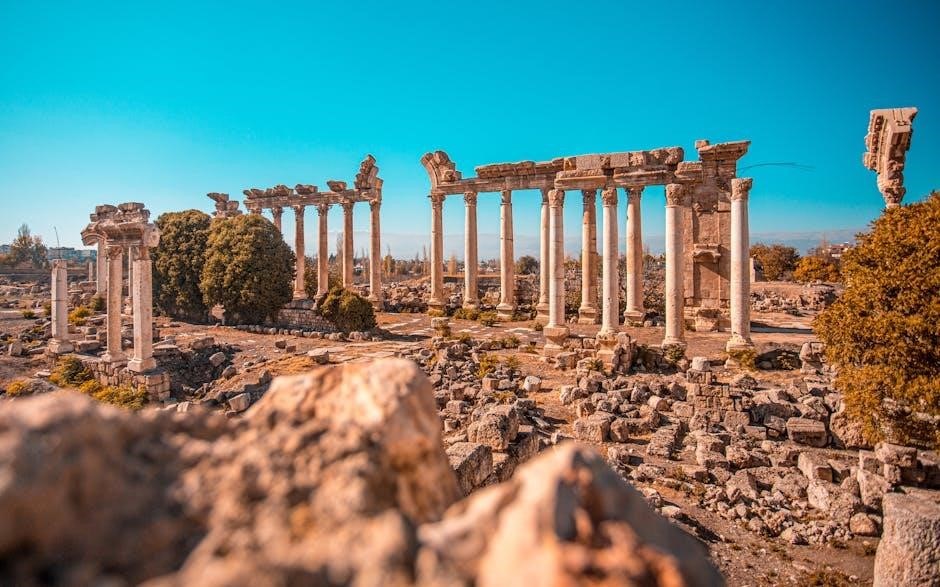Lebanon, a small Middle Eastern nation, offers a blend of rich ancient history, vibrant culture, and breathtaking landscapes, making it a compelling destination for global travelers․
1․1․ Geography and Climate
Lebanon, a small country in the Middle East, boasts a diverse geography characterized by a narrow Mediterranean coastline, rugged mountain ranges, and fertile valleys․ The Lebanon Mountains run parallel to the coast, while the Anti-Lebanon Mountains form the eastern border with Syria․ This unique topography creates a variety of climates, from the warm, humid Mediterranean coastal areas to the cooler, snowy mountain regions․ Summers are hot and dry, while winters are mild in the lowlands and cold in the mountains․ Spring and autumn bring mild temperatures, making them ideal for outdoor activities․ The geography supports lush forests, vineyards, and agricultural lands, contributing to Lebanon’s natural beauty and economic resources․
1․2․ Cultural Significance in the Middle East

Lebanon holds a prominent place in the cultural landscape of the Middle East, blending ancient traditions with modern influences․ Known for its rich history, Lebanon has been a crossroads of civilizations, leaving a legacy of art, literature, and architecture․ The country’s vibrant culture is reflected in its music, dance, and festivals, which are deeply rooted in its Phoenician, Roman, and Arab heritage․ Lebanese cuisine, renowned for its diversity and flavor, has gained global acclaim, showcasing dishes like hummus, tabouleh, and falafel․ The country’s contributions to regional arts, literature, and education have made it a cultural hub․ Lebanon’s resilience and adaptability have allowed it to maintain its unique identity while embracing global trends, making it a beacon of cultural richness in the Middle East․

Historical Landmarks and UNESCO World Heritage Sites
Lebanon is home to five UNESCO World Heritage Sites, including the ancient cities of Byblos, Baalbek, Tyre, Sidon, and the Qadisha Valley, showcasing its rich historical and architectural legacy of global significance․
![]()
2․1․ The Ancient City of Byblos
Byblos, a UNESCO World Heritage Site, is one of the oldest continuously inhabited cities in the world, dating back over 7,000 years․ This ancient Phoenician port is a testament to Lebanon’s rich history, featuring ruins from Roman, Crusader, and Ottoman periods․ Visitors can explore the historic harbor, the Temple of the Obelisks, and the impressive Crusader Castle, which now houses the Byblos Wax Museum․ The city’s cobblestone streets are lined with quaint shops, restaurants, and cafes, blending ancient charm with modern vibrancy․ Byblos is a must-visit destination for history enthusiasts and travelers seeking to connect with Lebanon’s storied past․
2․2․ Baalbek: Roman Ruins and History
Baalbek, a UNESCO World Heritage Site, is home to some of the most impressive Roman ruins in the world․ Located in Lebanon’s Beqaa Valley, this ancient city was once a major Roman colony and a center of worship․ The site features the iconic Temple of Bacchus, the Great Court, and the monumental Temple of Jupiter, which showcase extraordinary architectural precision․ Baalbek’s history dates back to the 1st century AD, and its ruins reflect a blend of Roman and local influences․ Visitors can explore the vast complex, which includes a massive stone quarry, where the Romans sourced materials for their structures․ The site’s grandeur and historical significance make it a must-visit for anyone interested in ancient civilizations and architectural marvels․ Baalbek also hosts cultural festivals, adding to its allure as a destination․
Vibrant Culture and Traditions

Lebanon’s culture is a rich blend of ancient heritage and modern influences․ Festivals, music, and art thrive, reflecting the nation’s resilience and hospitality․ Family and traditions remain central․
3․1․ Lebanese Cuisine: Must-Try Dishes
Lebanese cuisine is a delicious blend of Mediterranean flavors, offering a wide variety of dishes that cater to all tastes․ Some must-try dishes include hummus, a creamy chickpea dip, and tabouleh, a fresh parsley salad․ Falafel, crispy fried chickpea patties, and shawarma, grilled meat served in pita bread, are also popular street foods․ For a hearty meal, try kibbeh, ground meat mixed with bulgur, or maqluba, a rice and meat dish․ Don’t miss baklava, a sweet pastry filled with nuts, for dessert․ Lebanese restaurants like those in Gemmayze or Smallville offer authentic experiences․ The cuisine is known for its fresh ingredients and vibrant flavors, making it a highlight of any visit to Lebanon․
3․2․ Festivals and Celebrations
Lebanon’s vibrant culture is reflected in its numerous festivals and celebrations, which showcase its rich heritage and diverse traditions․ The Byblos International Festival and Baalbek International Festival are renowned for their music, theater, and cultural performances․ The Beirut Spring Festival celebrates art, music, and literature, bringing together local and international artists․ Religious celebrations like Eid al-Fitr and Christmas are joyously observed, with Beirut’s streets illuminated during Christmas․ The country also hosts various food and wine festivals, highlighting its culinary prowess․ These events offer visitors a chance to immerse themselves in Lebanon’s lively atmosphere and experience its cultural richness firsthand․

Best Places to Visit in Lebanon
Lebanon offers a mix of historical sites, stunning landscapes, and vibrant cities․ Explore the ancient ruins of Byblos, the majestic Cedars of God, and the scenic beauty of Mount Lebanon․

4․1․ Beirut: The Capital City
Beirut, Lebanon’s vibrant capital, seamlessly blends history and modernity․ Known as the “Paris of the Middle East,” it offers a rich cultural experience․ Visit the historic Corniche, a scenic waterfront perfect for strolls, and explore the National Museum of Beirut, showcasing ancient artifacts․ The city’s diverse neighborhoods, such as Gemmayzeh and Achrafieh, are bustling with trendy cafes, restaurants, and nightlife․ Don’t miss the Sursock Museum, a stunning venue for art and history, and Martyrs’ Square, a symbol of Lebanon’s resilience․ Beirut’s dynamic energy, combined with its historical significance, makes it a must-visit destination․ The city’s cuisine is equally captivating, with local eateries serving iconic dishes like falafel and shawarma․ Whether you’re exploring its past or enjoying its contemporary vibe, Beirut leaves a lasting impression on every traveler․
4․2․ Tripoli, Sidon, and Tyre: Exploring the South
The southern region of Lebanon is a treasure trove of history and culture․ Tripoli, the second-largest city, captivates visitors with its ancient souks and the impressive Citadel of Raymond de Saint-Gilles․ Sidon, a coastal city, boasts the Crusader Castle and the Temple of Eshmun, a well-preserved Phoenician site; Further south lies Tyre, a UNESCO World Heritage Site, where the Roman ruins, including the Hippodrome and necropolis, showcase the city’s glorious past․ Each city offers a unique glimpse into Lebanon’s diverse heritage, blending ancient history with vibrant local life․ Exploring these destinations provides a deeper understanding of the country’s historical and cultural richness, making the south a fascinating part of any Lebanon journey․
Practical Travel Tips and Safety Advice
Stay alert, follow local advice, and respect cultural norms․ Check latest travel advisories before planning your trip to ensure a safe and enjoyable experience in Lebanon․
5․1․ When to Visit: Best Seasons for Travel
Lebanon’s climate varies, but the best times to visit are spring (March to May) and autumn (September to October), offering mild temperatures and ideal conditions for sightseeing․ Summer (June to August) can be hot, especially in coastal areas, while winters (December to February) are cool with potential snow in mountainous regions․ Plan your trip during spring or autumn for comfortable exploration of historical sites and natural beauty․ Check local conditions and travel advisories before booking to ensure a smooth journey․
5․2․ Safety Guidelines and Travel Restrictions
Travelers to Lebanon should remain vigilant due to the country’s volatile security situation․ The UK Foreign, Commonwealth & Development Office (FCDO) advises against all but essential travel to certain areas․ Avoid regions near the Syrian border and areas with political unrest․ Stay informed about local conditions and follow government advisories․ Petty crime is common, so secure belongings and avoid displaying valuables․ Use reputable taxi services and avoid traveling alone at night․ Register with your embassy and ensure valid travel insurance․ Respect local customs and laws to avoid legal issues․ Stay updated on regional tensions and protests, as situations can change rapidly․ Always follow local authorities’ guidance and exercise caution when exploring unfamiliar areas․

